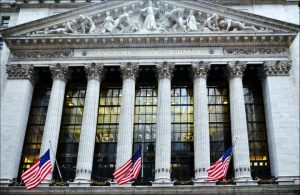 I have long been in favor of reforming Social Security by changing it to a system of personally owned retirement accounts.
I have long been in favor of reforming Social Security by changing it to a system of personally owned retirement accounts.
Instead of paying a payroll tax, with the U.S. government telling you what you’ll get when you retire, you take ownership of that money — the payroll tax — and invest in your own retirement account.
I am for IRAs not the IRS.
This is a good time to bring this up, following a big drop in the stock market. Such a drop, to many, is exactly the reason to not do this reform.
As of this writing, the stock market dropped around 5 percent. What is officially called a market “correction” is a drop of 10 percent.
However, over the last year, the stock market has increased 26 percent. Since the presidential election in November 2016, it’s up 35 to 40 percent.
The point is, stocks are a long-term proposition and so is retirement investing. Although gyrations are part of the day-to-day reality of stocks, over the long haul they provide positive returns. Because they reflect the underlying health of the economy, if stocks aren’t healthy in the long run, it means the country is not healthy in the long run. The historical annual average return on stocks is 8 percent.
Stocks are like life. Time, optimism and faith smooth out the ups and downs. I’ll take the ups and downs of a free life and a free marketplace over turning control of my life over to politicians.
In 2010, William Shipman and Peter Ferrara published an analysis in The Wall Street Journal of what would have happened to a couple who invested their payroll tax in their own retirement account, over 44 years, and then retired in 2009, the year after the huge stock market drop in 2008. In 2008, their account lost 37 percent of its value.
Even this huge one-year drop did not offset the accumulated positive gains. The average return from 1965 to 2009 was 6.75 percent and “would still pay them about 75 percent more than Social Security would have.”
But even this is not the main point. Although it makes sense to be invested in stocks over a 40-year plus working life, no one is saying you have to do it. You can buy bonds or put the money in a bank CD.
The main point is that every citizen should be free to have these options.
There are particularly important implications here to black Americans.
Per the Federal Reserve, in 2016 median black family net worth was $17,600, about 10 percent of median white family net worth.
Thirty-four percent of black families have retirement accounts, compared with 60 percent of white families, and 31 percent of blacks have some kind of stock ownership compared with 61 percent of whites. And only 8 percent of blacks have received wealth through inheritance compared with 26 percent of whites.
Social Security provides survivor benefits to spouses and unmarried minor children. As of 2012, 36 percent of blacks over 25, compared with 16 percent of whites, had never been married. Because of the sorry state of marriage and family in black America, a large percentage of black Americans will have paid into Social Security over a full working life, and those benefits will just go up in smoke when they pass away.
With all the handwringing about gaps in wealth and income in our country, if we were serious we would have policies that promote, rather than prohibit, ownership.
Let’s at least give low-income Americans the option to get out of Social Security and invest in personal retirement accounts to build ownership and wealth that can be bequeathed to others.
This would be a great way to celebrate Black History Month.
COPYRIGHT 2018 STAR PARKER
DISTRIBUTED BY CREATORS.COM
Photo credit: George Rex (Creative Commons) – Some rights reserved
 Star Parker is the founder and president of the Center for Urban Renewal and Education. Contact her at www.urbancure.org.
Star Parker is the founder and president of the Center for Urban Renewal and Education. Contact her at www.urbancure.org.
 CURE News and Clergy Blog News and Commentary for Christians
CURE News and Clergy Blog News and Commentary for Christians



